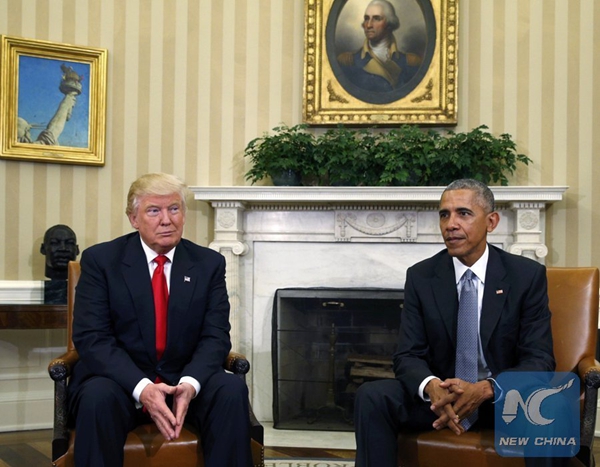Donald Trump and the demise of political science
- By Heiko Khoo
 0 Comment(s)
0 Comment(s) Print
Print E-mail China.org.cn, November 11, 2016
E-mail China.org.cn, November 11, 2016
|
|
|
U.S. President Barack Obama (R) meets with President-elect DonaldTrump to discuss transition plans in the White House Oval Office in Washington, U.S., November 10, 2016. (Xinhua/REUTERS) |
Perhaps the greatest puzzle of Donald Trump's presidential election victory lies in the contrast between the technical, scientific and economic prowess of the United States and the narrow, simplistic and bigoted rhetoric of its newly chosen leader.
On the eve of the election the mainstream political experts solidly predicted a victory for Hillary Clinton. Indeed, the global polling industry, whose research charts the popular mood, has, once again, proven to be so much hocus-pocus.
The reason why the most expensive and technically sophisticated tools of political analysis utterly failed is rooted in the theoretical framework of the modelling systems employed. The core philosophy that guides modern political analysis rests on the assumption that the basic structure of society is built on solid and relatively unchangeable foundations.
In established representative democracies, the flexibility to change parties and personnel and to subject them to electoral forms of accountability and popular scrutiny acts as a safety valve. This prevents any challenge to the basic structure of the social system from getting out of hand. The "free press," the checks and balances of an independent judiciary, and the right of people to express discontent in protests, strikes and other forms of popular dissent are additional tools, which help to restore the social equilibrium in times of crisis.
The rise and fall of economies driven by private investment is determined by the rate of profit i.e. the return on investment. The accumulation of capital originates from the unpaid labor power of the working class. Private capitalist companies compete with each other in the marketplace on a world scale. Corporate operations are planned to ensure organizational efficiency and technological supremacy, but the planning system constitutes a secret terrain based on proprietary modelling systems designed to secure a competitive advantage in the marketplace. Government is supposed to help facilitate an environment in which private companies flourish. Therefore the political process tends to congeal into an instrument designed to reproduce the existing hierarchy of wealth and power in society. This means that the working classes must remain a subordinate and generally passive social force. Politics is primarily the concentrated expression of business interests. This is the theoretical framework, which Karl Marx developed. It helps us to understand the emergence of the system, its period of flowering and its periodic crises, which indicate that the system will eventually disappear.
What then can explain the phenomena of Donald Trump's victory? The deep economic crisis has been accompanied by an extraordinary rise in inequality. The impoverishment of large sections of the middle-class has stirred up a cauldron of social discontent. This produced a disgruntled and angry electorate, which found expression in the mass rallies in support of Bernie Sanders in the primaries, held to determine the Democratic Party nominee, as well as in Trump's final victory.
Whereas Sanders appealed to the brains of the working class and middle class with his critique of inequality and greed, Trump appealed to the most backward prejudices of these alienated constituencies. He spouted racism, xenophobia, homophobia and sexism. He appealed to the culture of a bygone age, where the mores of political correctness did not apply. His Mexican wall, his ban on Muslims, his lustful groping of women: all give expression to his crude mind-set that yearns to restore some status in the social hierarchy for the white male worker and the small businessman.
As for the subordinate classes, many of whom supported Trump rather than Clinton, disillusion will settle in quite quickly. Naturally, the person best placed to capitalize on this is Bernie Sanders. If he is able to develop a movement that unifies the working-class behind a party based on class rather than race, he will be knocking on an already open door. As the workers of the United States find their way towards solidarity - in the face of their real enemies, oppressors and exploiters, the giant companies and banks - the idea to create a party of the working class, a party of Labor, can spread like wildfire, conquer the minds of the masses and transform the nation.
Heiko Khoo is a columnist with China.org.cn. For more information please visit:
http://www.china.org.cn/opinion/heikokhoo.htm
Opinion articles reflect the views of their authors, not necessarily those of China.org.cn.







Go to Forum >>0 Comment(s)